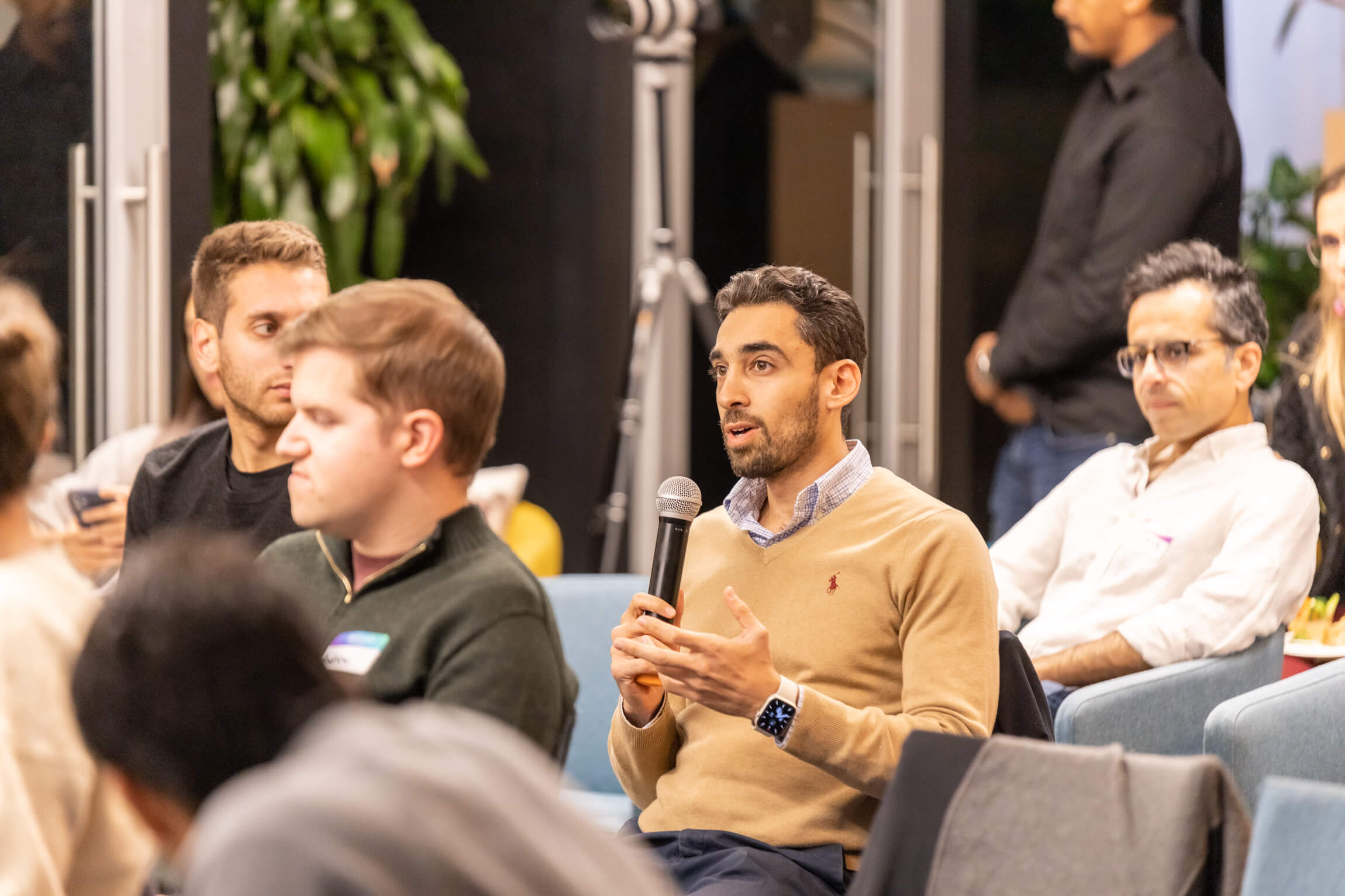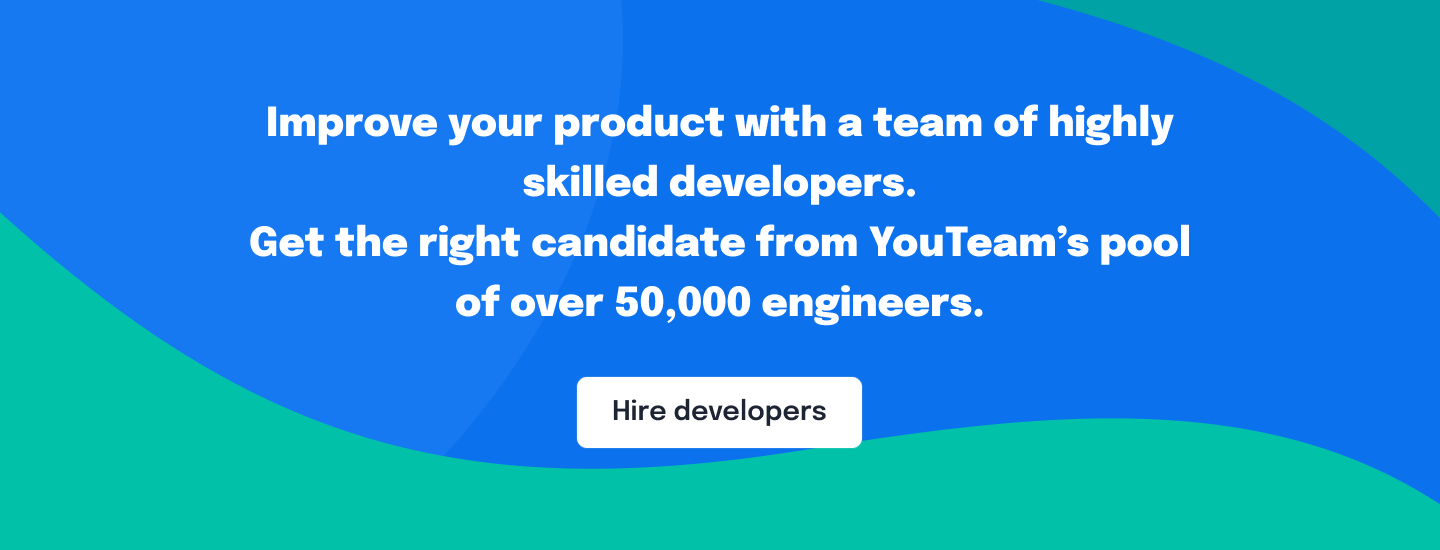On Nov. 3, 2022, YouTeam hosted a panel discussion on “How to Hire the Perfect Engineer.” The event was held as part of San Francisco Tech Week and focused on the current state of the tech talent market, the difference in hiring in-house employees and contractors, and testing candidates’ soft skills. We’re publishing a text version of the discussion so you can learn from the highlights shared by the speakers.
Speakers:
- Ammon Bartram, co-founder and CEO of Triplebyte
- Yura Riphyak, co-founder and CEO of YouTeam
Moderator:
- Lidiya Terpel, co-founder and CEO of Skyworker
Table of Contents
Current State of the Tech Talent Market
Lidiya:
Let’s start with a question about the significant number of vacancies for new job candidates. The latest data shows 27 million tech workers on the market, and only 11 percent are open for new jobs. At the same time, we know about the threat of recession, and many companies had layoffs. What do you think? Is it still a candidate-oriented market, or has something changed?
Ammon:
There has been a significant reduction in demand over the last six months. Our internal data and the applicant tracking systems data from a bunch of big companies shows about a 60% decline in the number of open engineering recommendations posted. Moreover, if you are an in-demand specialist, a 10x engineer, you still have competition.
There is a key takeaway for everybody here hiring — this is the easiest time in the last ten years to hire a skilled person, so if you’re trying to get that excellent experienced security engineer or whatever the specialization is, jump on it right now. Software engineers are going to have less demand.
Yura:
Well, it’s hard to add anything. What I would do now is I would hire like crazy because the talent that is available now wasn’t available a few months ago. You have an opportunity window.
This is the easiest time in the last ten years to hire a skilled person, so if you’re trying to get that excellent experienced engineer, jump on it right now.
There are more junior professionals than jobs, so it’s relatively easy to find someone fresh out of college, and there are always fewer experienced top-level candidates than jobs and opportunities for them, even in the current market. However, when you allow for a little bit of risk and give mid-level developers with 3-5 years of experience credit, that’s where the most change happens, in the middle of the market.
Closing Skill Gaps with Offshore Engineers
Lidiya:
Do you focus on a particular geography of candidates? Do you look at emerging markets as well? What do you think about remote working in the post-Covid era? Will US companies hire more candidates from other countries?
Yura:
The future of work is much more about contracting than it is right now. Yeah, it may sound like a professional deformation because of what we do (Yura is smiling), but two crucial trends dominate today. First, it’s a furthering of globalization, especially in the workplace. The taboo for remote work and hybrid distributed teams is now broken for most companies.
The second trend, which is less obvious, is the acceleration of technological change. As the world moves faster, skills also become obsolete more quickly. Companies are experiencing skill gaps more often. It’s tough for people to reskill and close these gaps — reskilling is additional work they put on top of their position and the work they are already doing.
That’s why the relative percentage of code written by contract engineers has more than doubled in the last decade. A company needs to get the job done, so it resorts to contractors more often. At the same time, humans have not changed for thousands of years. We have the same risk preferences and favor stability and financial security. So developers want to avoid jumping from one job to another or finding themselves in job search limbo.
Therefore, the ideal model is to stay with the same employer and steadily move up the career ladder so engineers can avoid constantly looking for a job. Meanwhile, they can work on ten different projects for ten different clients. That’s why I’m so optimistic about the consulting model. It looks most suitable for such a future, which is changing at a rapid pace.
Lidiya:
Ammon, I know that you’re focused on candidate validation. What do you think about the future of contractors and in-house employees?
Ammon:
The only point I would add is that the demand for software engineers is high, and the evidence shows that all these options are growing. Offshore hiring is growing faster than domestic hiring, and contracts are being awarded faster than for full-time hires. However, overall all categories are growing, and I don’t see any near-term trends that could turn that around.
The relative percentage of code written by contract engineers has more than doubled in the last decade.
So if we fast forward 20 years, we might see a lot more contracting in Eastern Europe, Latin America, and other time zones. However, I think that if someone wants to build a career as a software engineer in the United States, there will be high-paying jobs for that person for the foreseeable future.
Browse 500+ Dev Teams Available for Hire
Growing Technical Expertise Inside the Company vs. Outsourcing
Lidiya:
You may have thoughts about hiring first team members. I’ve told you before that my story of hiring a CTO is magical. I hired him on a plane — I was on the hunt for four hours, and he couldn’t escape — we were in the sky. And what was your experience of building tech teams from scratch?
Ammon:
We’re all running hiring tools. My advice for your first few hires is that there are better options than the products here (hiring marketplaces). What we’re building here are tools that help you scale, i.e., bring people into your team in a repeatable way, and that’s different for your first hires.
You want somebody you gel with really well, and you want to set an irrationally high bar. Let’s be frank — you’re typically not that compelling an employer when you’re looking for your first employee. You will pay less, give equity, and try to sell a dream and what you’re building. So it’s better if you have connections to somebody you went to school with, or who you know was an exceptional engineer, or somebody who’s a friend of a friend of yours. For the first few hires, look at your network and only fall back on any of our products if you can’t find somebody among that network.
Lidiya:
I also have a question for Yura as the startup founder. You are familiar with both sides. Y Combinator’s approach is that you have to grow your technical expertise inside the company. At the same time, I know many companies that outsource their technical tasks, yet they have fantastic evaluations and receive investments from well-known funds. Could you give some examples of your customers and explain how to make a selection for startups that have just started hiring B2B contractors?
Yura:
The short answer is that if you are a startup hiring your first team members, wait to hire contractors. There are different tasks at different stages of the company’s work. When you see the product’s termination date or need to build a feature that may discontinue in six months, it is probably better to avoid taking additional overhead and hire contractors instead. But if you’re a technology business and it’s your core product, you might want to keep as much internal expertise as possible and focus on upskilling your core team.
Another thing is needing specific expertise that your core team doesn’t possess. Such a skill gap usually happens when you create integrations or versions of your application for different platforms. In this case, you need a short-term engagement of a relevant expert and maybe some maintenance afterward, which is another good case for hiring contractors.
If you’re a tech business and it’s your core product, you might want to keep as much internal expertise as possible and focus on upskilling your core team.
Сommon Misconceptions in Testing Candidates’ Soft Skills
Lidiya:
Many clients ask me about testing candidates’ soft skills because they want to check for cultural fit. Is it possible to do this with tech tools, and how do you address these customer needs?
Yura:
People are just very good at interviews and presenting themselves, and then it turns out that it’s an entirely different person at work. What works best is a trial period. You must be prepared to lose money and make mistakes because no interview or test gives you more than a 50% guarantee. When you hire, you always guess; when you fire, you always know.
It boils down to checking three human skills that matter in the workplace: the ability to communicate, collaborate with others, and be enthusiastic.
Ammon:
The worst way is to get a person in a room, talk to them, and try to make a judgment — does this feel like somebody I want to work with? That’s where people get led astray by some reasonably strong sources of bias: whether this person looks like someone I used to know or someone I used to dislike, whether their voice reminds me of someone smart or someone I think is not so bright.
Instead, in 95% of cases, it boils down to checking three human skills that matter in the workplace: the ability to communicate, collaborate with others, and be enthusiastic, which means adding overall energy and positivity to achieving a company’s goals.
The Future of Recruitment Platforms
Lidiya:
How do you see the future of recruitment tools? I’ve heard from investors that they think it’s hard to grow such a startup into a new unicorn — a new LinkedIn, new Indeed — in this red ocean of products. What should these products look like, and what tech recruiting problems should they solve?
Ammon:
Despite being the current dominant model, I think sourcing is dying. You hire a team of recruiters to send hundreds of messages to potential candidates, typically on LinkedIn. And it’s getting worse: the number of messages you have to send per hire has increased over the last five years.
By using a marketplace with better skills data and a better matching process, companies won’t go back to a “spray and pray” strategy. And I think LinkedIn will need more time to make that transition so that some other major player will emerge in the recruiting industry that can match candidates more intelligently.
Yura:
I completely agree that the marketplace is the best model for hiring. When you must choose among many candidates, the model can use collaborative filtering to compare them.
I also think we need to look closely at the development of no-code and low-code tools, especially those that use machine learning and AI. I feel they have the potential to make a difference, not to replace humans, but rather to make them more efficient and to enhance the capabilities of software engineers. You will need a much smaller team to do the tasks, and such tools will further democratize the tech industry and stimulate innovation.
Lidiya:
Thank you. I just want to add that we should initially try to find out what developers are interested in, provide project information, and conduct interviews accordingly. Doing this will help make recruiting much more effective.
Thanks to all the speakers for sharing their experiences with today’s audience. The evening continues with networking and drinks, kindly provided by the organizer. Thanks, everyone!
Want more insights from industry experts? YouTeam has launched a series of webinars on the latest tech talent market trends, the future of remote work, and engineering team management. Visit our website to see our planned events and watch recordings of past webinars.









